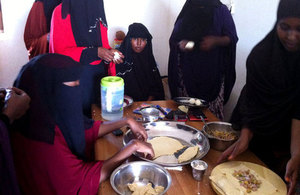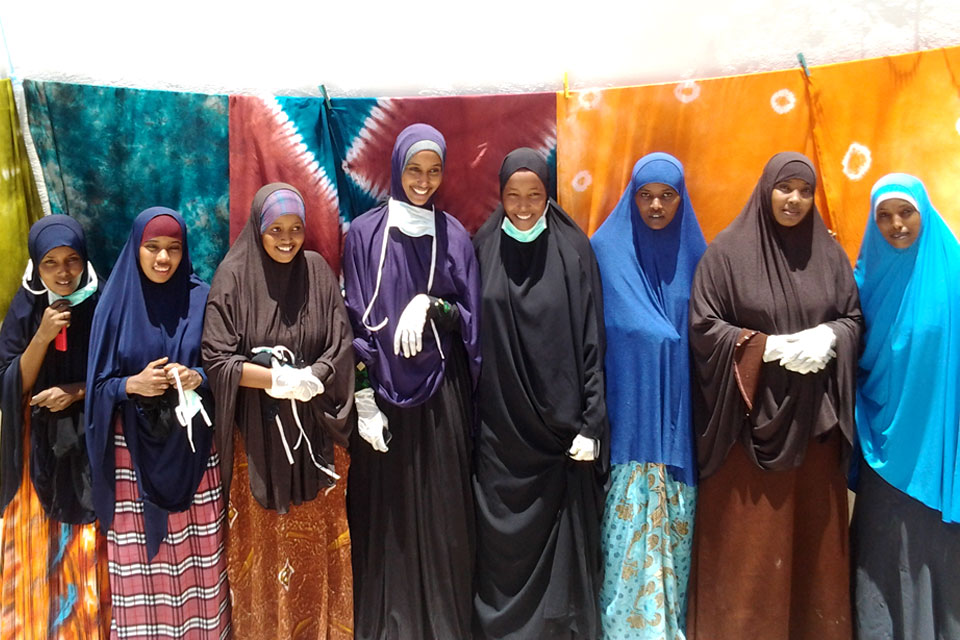Sweet path to success: improving economic livelihoods for Somali women
A UK aid funded programme is helping disadvantaged women and youth by providing vocational training on life skills.

Beneficiaries on the SEED programme learning how to prepare confectionaries and sweets. Picture: Coffey International
“This training has given me confidence in myself and my skills to go out and make a living on my own,” says 22-year-old Hawa Osman. “The programme has given me access to skills and training that was previously unavailable to me,” she adds.
Hawa and 27-year-old Farhiya Mohamed, participated in hospitality training courses offered by the Vocational Training Centre (VTC) in Garowe, the regional capital of Puntland. The training, which is supported by the UK aid funded Sustainable Employment and Economic Development (SEED) programme, provided them with the knowledge to prepare various kinds of confectionaries and sweets.
Through the programme they were also able to get practical experience by taking part in a work placement at the Towfiiq Hotel and Restaurant in Garowe.
“Our trainer has great experience in this field and she makes everything easy and understandable,” says Farhiya.
Women supporting women
Faduma Sheik Adirahman, owner of the Towfiiq Hotel, was approached by the American Refugee Committee (ARC) to discuss her staffing and training needs. “As a woman, I was excited to be part of a programme that wants to help women stand on their own two feet,” Adirahman said.
“My workers are all men and it is good to have hard working women helping with our productivity. I want to hire Farhiya and Hawa if I open a new centre and I want to continue to work with the VTC here in Garowe as long as they continue to support women,” Adirahman added.

Women who are benefiting from the vocational training provided by the UK aid supported SEED programme. Picture: Coffey International
Improving women’s access to employment opportunities
The UK is working with women and young people in conflict affected communities in Somalia to improve economic and employment prospects. With an increase in women-headed households and families dependent on a woman’s income, these business-orientated training services provide a much needed focus on women’s access to employment opportunities across the country. This work is being carried out as part of the UK’s aim of creating long term stability in Somalia.
Whether or not they are given long term employment at the Towfiiq Hotel, Farhiya and Hawa are very optimistic about the future. “I have my own small shop and I plan to expand my business to include the different kinds of sweets I have learnt how to prepare,” Farhiya said.
Facts and stats
As part of the UK aid funded SEED programme, the FAO and the World Bank were contracted as lead implementing partners to improve the economic and employment prospects of people in conflict affected communities.
As part of this approach, FAO, under the SEED programme’s Market Development component, worked with the American Refugee Committee (ARC) to increase the employment rates and economic opportunities for disadvantaged youth and women by providing technical and vocational education and training (TVET) in numerous districts in Somalia. The TVET component of this scheme involved making contact with local businesses to assess their needs when hiring new staff.
The SEED programme consists of 2 components:
-
Market Development Component (FAO): It aims to develop markets and create employment with accompanying skills training, focusing on agriculture (South Central Somalia), fisheries (Puntland) and livestock (Somaliland)
-
Investment Climate and Regulatory Framework Component (World Bank): It aims to strengthen the investment climate and regulatory framework of Somaliland to increase investment and growth.
Since inception of the SEED programme, over 5000 people have received training of which 1,000 were trained on market driven skills.
While the SEED programme comes to a conclusion at the end of the DFID 2014/15 financial year, DFID will implement a new programme, Promoting Inclusive Markets in Somalia (PIMS), which will build on the achievements of the (SEED) programme.